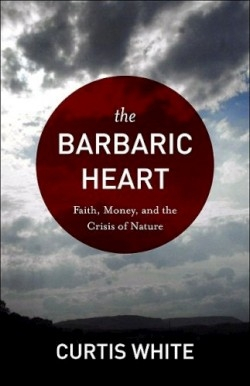The Barbaric Heart
Faith, Money, and the Crisis of Nature
Curtis White believes that it’s a mistake to blame the global environmental crisis on greedy corporations or self-interested polluters. In his provocative and intellectually acrobatic new book The Barbarian Heart, White—an essayist, novelist, English professor, and the author of The Middle Mind: Why Americans Don’t Think for Them-selves—argues that pointing fingers toward “powerful corporate evildoers” only leads us to “think in cartoons,” thereby obscuring the underlying causes of environmental degradation. But the truth, White warns, might be difficult to face: that our destructive ways originate in human nature itself.
White theorizes that humans are saddled with the legacy of “the barbaric heart,” an ancient instinct that drives all individuals to attempt to maximize personal prosperity. Like marauding barbarians razing a great city to the ground, human beings all too often wreak havoc and destruction while striving to secure their wealth and subsequent happiness. “This,” White writes, “is the barbaric calculation: if you can prosper from violence, then you should go ahead and be violent.” As he sees it, human beings must free themselves of these deep-seated “barbaric” impulses if there’s to be any hope of preventing human-created environmental, economic, and political catastrophes in the future.
It’s a good thing that White is an extremely engaging writer and sharp-minded critic, for otherwise his pervasive moralistic pessimism might have swiftly sunk his book’s appeal. Throughout The Barbaric Heart, he does not skimp on doom and gloom—which suits his subject matter on the whole, but occasionally leads him down paths of excessive and unconvincing crankiness. As compelling as his arguments often are, it’s hard to follow him when he dubiously equates America’s embrace of multicultural viewpoints with “nihilism,” or when he dismisses outright the powers of science and government to solve environmental problems.
Given his generally dismal perspective, White’s proposed solution for taming the ferocity of the barbaric heart contains a surprisingly romantic measure of hope. White believes that humans might someday create a more “thoughtful” world, in which we will no longer be “slaves, and not instruments of violence, but beings intent upon the beautiful as a social principle.” Although White offers few practical details as to how art and beauty might be able to save the natural world, his optimism is bound to inspire readers of an intellectual and creative bent to strive to bring about positive change in the world.
Disclosure: This article is not an endorsement, but a review. The publisher of this book provided free copies of the book to have their book reviewed by a professional reviewer. No fee was paid by the publisher for this review. Foreword Reviews only recommends books that we love. Foreword Magazine, Inc. is disclosing this in accordance with the Federal Trade Commission’s 16 CFR, Part 255.

